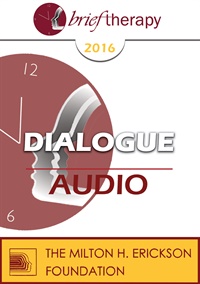
- Average Rating:
- Not yet rated
- Topic Areas:
- Attachment | Neuroscience | Psychology | Dialogues | Mindfulness | Buddhism | Psychotherapy
- Categories:
- Brief Therapy Conference | Brief Therapy Conference 2016
- Faculty:
- Ronald Siegel, PsyD | Stan Tatkin, PsyD, MFT
- Duration:
- 1:03:00
- Format:
- Audio Only
- Original Program Date:
- Dec 10, 2016
- Short Description:
- BT16 Dialogue 3 - Mindfulness, Buddhist Psychology, Neuroscience, and Attachment - Ron Siegel, PsyD, and Stan Tatkin PsyD, MSW Dialogue on Mindfulness, Buddhist Psychology, Neuroscience, and Attachment
- Price:
- $15.00 - Base Price
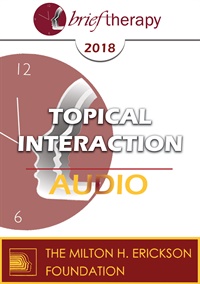
- Average Rating:
- Not yet rated
- Topic Areas:
- Topical Interactions | Attachment | Brief Therapy | Therapist Development
- Categories:
- Brief Therapy Conference | Brief Therapy Conference 2018
- Faculty:
- Stan Tatkin, PsyD, MFT
- Duration:
- 1:10:38
- Format:
- Audio Only
- Original Program Date:
- Dec 08, 2018
- Short Description:
- Working with various attachment organizations requires a deep understanding of both attachment theory and sensitivity to the fears and apprehensions of insecures on both distancing and clinging sides of the spectrum. We will discuss the benefits of using crossing techniques in couple therapy to minimize defensive reactions and to increase intervention effectiveness. Also, we hope to cover the matter of unresolved trauma and loss in the emergence of disorganization during therapy.
- Price:
- $15.00 - Base Price
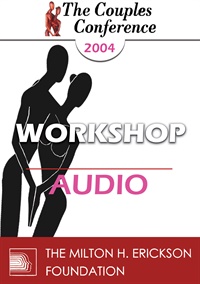
- Average Rating:
- Not yet rated
- Topic Areas:
- Workshops | Attachment | Couples Therapy | Divorce | Marriage | Neuroscience
- Categories:
- Couples Conference | Couples Conference 2004
- Faculty:
- Helen E. Fisher, PhD
- Duration:
- 1:51:10
- Format:
- Audio Only
- Original Program Date:
- Mar 28, 2004
- Short Description:
- This workshop discusses the brain circuitry of the three primary mating emotions: lust, attraction and attachment. It traces the evolution of these emotion systems and illustrates how their neural circuitry contributes to contemporary patterns of marital harmony and discord including adultery; divorce; stalking behavior; clinical depression due to rejection in love; and other issues brought to contemporary couples therapy.
- Price:
- $15.00 - Base Price
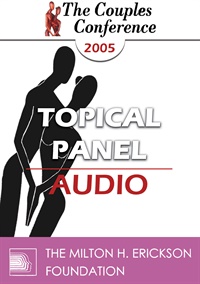
- Average Rating:
- Not yet rated
- Topic Areas:
- Topical Panels | Attachment | Couples Therapy | Differentiation
- Categories:
- Couples Conference | Couples Conference 2005
- Faculty:
- Ellyn Bader, PhD
- Duration:
- 1:05:52
- Format:
- Audio Only
- Original Program Date:
- Mar 05, 2005
- Short Description:
- CC05 Panel 02 - Attachment and Differentiation in Couples Therapy - Ellyn Bader, PhD
- Price:
- $15.00 - Base Price
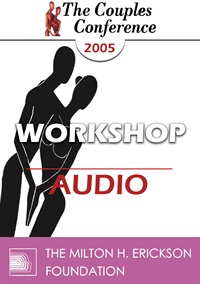
- Average Rating:
- Not yet rated
- Topic Areas:
- Workshops | Attachment | Couples Therapy
- Categories:
- Couples Conference | Couples Conference 2005
- Faculty:
- Sue Johnson, EdD
- Duration:
- 1:56:15
- Format:
- Audio Only
- Original Program Date:
- Mar 05, 2005
- Short Description:
- CC05 Workshop 10 - Attachment Theory: A Map for Couples Therapy - Susan Johnson, EdD
- Price:
- $15.00 - Base Price
Tags: Attachment Couples Therapy
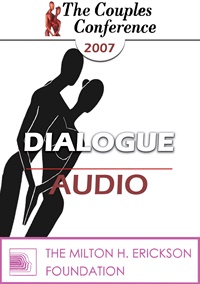
- Average Rating:
- Not yet rated
- Topic Areas:
- Dialogues | Attachment | Couples Therapy | Differentiation
- Categories:
- Couples Conference | Couples Conference 2007
- Faculty:
- Ellyn Bader, PhD | Stan Tatkin, PsyD, MFT
- Duration:
- 1:03:29
- Format:
- Audio Only
- Original Program Date:
- Apr 28, 2007
- Short Description:
- CC07 Dialogue 01 - Integrating Attachment and Differentiation-Based Interventions in Couples Therapy - Ellyn Bader, PhD, and Stan Tatkin, PsyD
- Price:
- $15.00 - Base Price
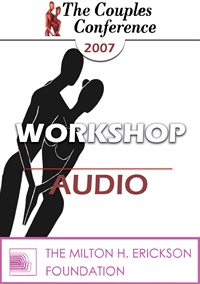
- Average Rating:
- Not yet rated
- Topic Areas:
- Workshops | Affairs | Deception | Couples Therapy | Attachment | Differentiation | Relationships
- Categories:
- Couples Conference | Couples Conference 2007
- Faculty:
- Ellyn Bader, PhD
- Duration:
- 2:01:31
- Format:
- Audio Only
- Original Program Date:
- Apr 28, 2007
- Short Description:
- Lies and deception wreak havoc in couples' relationships. To work successfully with couples after significant betrayal, the therapist must use attachment and differentiation-based interventions. Learn to identify three patterns of deception; when deception can be repaired and when it can't; and what is the essence of successful repair.
- Price:
- $15.00 - Base Price
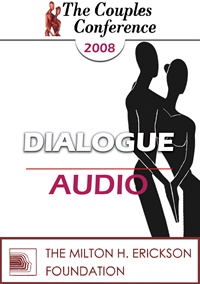
- Average Rating:
- Not yet rated
- Topic Areas:
- Dialogues | Attachment | Couples Therapy
- Categories:
- Couples Conference 2008 | Couples Conference
- Faculty:
- Sue Johnson, EdD | Stan Tatkin, PsyD, MFT
- Duration:
- 56:43
- Format:
- Audio Only
- Original Program Date:
- Apr 25, 2008
- Short Description:
- CC08 Dialogue 01 - Key Concepts from Attachment Theory That Influence Your Work - Susan Johnson, EdD and Stan Tatkin, PsyD
- Price:
- $15.00 - Base Price
Tags: Attachment Couples Therapy
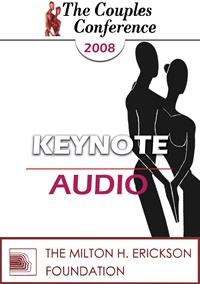
- Average Rating:
- Not yet rated
- Topic Areas:
- Keynotes | Attachment | Couples Therapy | Love | Relationships
- Categories:
- Couples Conference | Couples Conference 2008
- Faculty:
- Sue Johnson, EdD
- Duration:
- 1:00:13
- Format:
- Audio Only
- Original Program Date:
- Apr 26, 2008
- Short Description:
- CC08 Keynote 04 - The Science of Love: Lessons for the Couple Therapist - Susan Johnson, EdD
- Price:
- $15.00 - Base Price
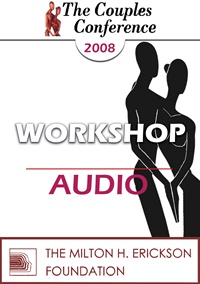
- Average Rating:
- Not yet rated
- Topic Areas:
- Workshops | Attachment | Couples Therapy | Emotionally Focused Therapy (EFT)
- Categories:
- Couples Conference | Couples Conference 2008
- Faculty:
- Sue Johnson, EdD
- Duration:
- 2:39:21
- Format:
- Audio Only
- Original Program Date:
- Apr 25, 2008
- Short Description:
- This workshop will outline the use of attachment theory in the assessment of Relationship problems, setting of treatment goals, creation of change events and moment to moment interventions in emotionally focused couples therapy.
- Price:
- $15.00 - Base Price
Please wait ...

